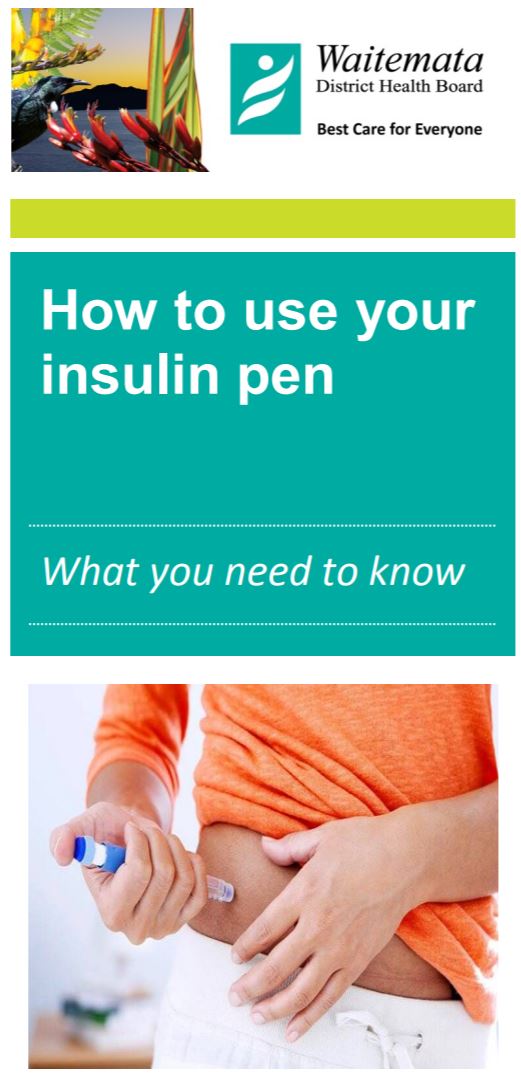There are 3 different-sized syringes available in New Zealand: 0.3mL, 0.5 mL and 1 mL. The strength of all funded insulin in New Zealand is 100 units/mL, so a 0.3 mL syringe has doses of up to 30 units.
If you mix insulins in the syringe, you may prefer a larger syringe (0.5 mL or 1 mL) to allow for ease of mixing.
Low or no data? Visit zero.govt.nz, scroll down the page then click on our logo to return to our site and browse for free.
Insulin syringes and needles
Key points about insulin syringes
- Insulin syringes with needles can be used for giving insulin to young children for insulin not available in cartridge form and when mixing 2 insulins together.
- There are 3 different-sized syringes available in New Zealand: 0.3mL, 0.5 mL and 1 mL.
- Although insulin pens are generally more common than insulin syringes, insulin syringes with needles can be used for giving insulin to young children for insulin not available in cartridge form and when mixing 2 insulins together.
- Find out how to use insulin syringes safely.

- Needles are attached to syringes.
- Needles are available in different sizes and are measured by their thickness (gauge or G) and their length (in mm), eg, 31 gauge x 8 mm.
- The higher the gauge, the thinner the needle, eg, a 31 gauge needle is thinner than a 28 gauge needle.
- The shortest needle size available in New Zealand for syringes is 8 mm.
- Shorter length needles are the safest to use as they help ensure the dose is delivered into the subcutaneous fatty tissue (the layer just beneath your skin) and not the intramuscular tissue.
- Longer needles may be a better option for people with coordination challenges or larger people with higher BMIs.
- Administration at 45 degrees is recommended to avoid the intramuscular tissue.
- Learn more about insulin administration.

Syringe and needle sizes available in New Zealand
The following sizes are funded:
- 0.3 mL with 29 gauge x 12.7 mm needle
- 0.3 mL with 31 gauge x 8 mm needle
- 0.5 mL with 29 gauge x 12.7 mm needle
- 0.5 mL with 31 gauge x 8 mm needle
- 1 mL with 29 gauge x 12.7 mm needle
- 1 mL with 31 gauge x 8 mm needle.
If you are unsure which syringe and needle size is best for you, or if you need to change sizes, talk to your healthcare provider.
Note: Needles for insulin pens are available in different sizes (4 mm–12.7 mm in length). Read more about insulin pens and needles.
Funding
A new needle should be used with every injection. In New Zealand you can have 200 subsidised (free) needles on a prescription. If you need more than 200 needles in 3 months, you will need another prescription and this will still be free.
The decision to use syringes or pens is a personal one. Here are some points to think about:
- Insulin pens are easy to carry around and make measuring and injecting your insulin easier. Injections can be administered discretely. Most pens hold 300 units of insulin and can give up to 60–80 units at a time. Most insulins are available as pens. Pens also allow the use of a 4 mm needle, which can be safer for ensuring administration into the subcutaneous area.
- Syringes hold up to 100 units. They may be best if you use mixed insulins or if you're giving insulin to a child.
Talk to your healthcare provider for more advice. Read more about insulin pens and insulin injection technique.
Short and rapid-acting insulins can also be given by a portable insulin pump. This delivers continuous insulin and you can give extra insulin at meal times. These pumps can be useful for people who have hypoglycaemia often or if their blood glucose levels are difficult to control. There are certain criteria for funding and there are many options available.
In New Zealand, insulin pumps are generally only recommended for people with type 1 diabetes. For more information, see the following:
Insulin pumps with diabetes(external link) Starship NZ
Insulin pumps(external link) Health New Zealand | Te Whatu Ora
Insulin syringes(external link) Diabetes NZ
Insulin injection sites
Insulin pens
Resources
Insulin pumps with diabetes(external link)(external link) Starship NZ
Diabetes and insulin(external link)(external link) Diabetes New Zealand, 2019
How to use your insulin pen [PDF, 320 KB]Waitemata DHB, NZ, 2020
Insulin Patient Guide(external link)(external link) Waitematā DHB, NZ
5 questions to ask about your medications(external link) Health Quality and Safety Commission, NZ, 2019 English(external link), te reo Māori(external link)
References
- Syringes(external link) NZ Formulary
- Needles(external link) NZ Formulary
Brochures

Starship NZ

Waitematā DHB, NZ

Waitemata DHB, NZ, 2020
Credits: Sandra Ponen, Pharmacist, Healthify He Puna Waiora. Healthify is brought to you by Health Navigator Charitable Trust.
Reviewed by: Maya Patel, Pharmacist, Auckland
Last reviewed:
Page last updated:





